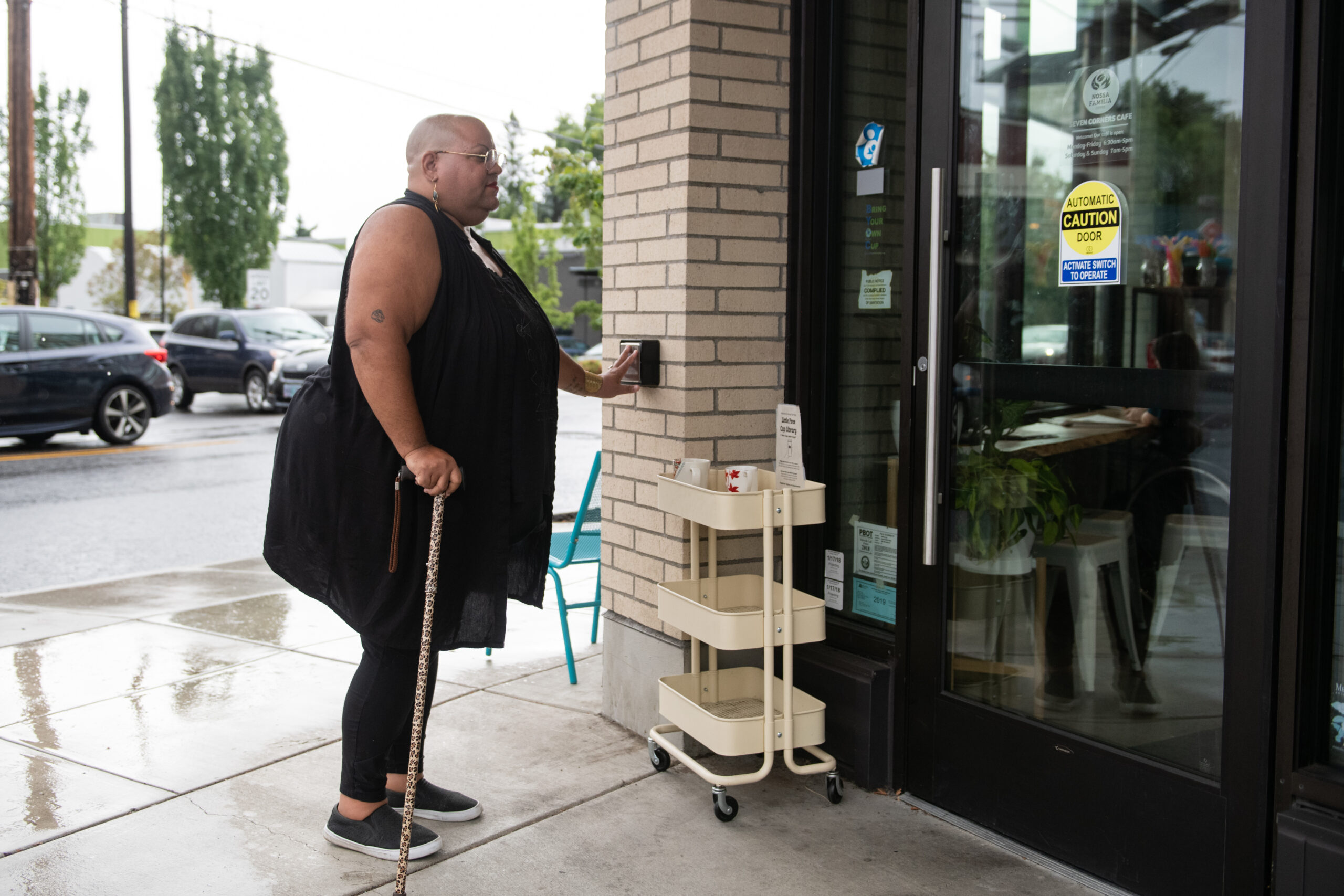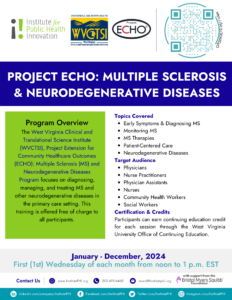
Rural Multiple Sclerosis Solutions
Improving access to diagnostic and support resources for rural populations impacted by multiple sclerosis in Maryland, North Carolina, Virginia, and West Virginia.
In 2022, IPHI expanded its focus to include support for people living with multiple sclerosis (MS) and medical providers in rural areas. This 3-year project is funded by the Bristol Myers Squibb Foundation.
Through the project, IPHI and various community partners will:
- Create a tool to simplify navigation for people seeking MS resources.
- Provide education and training to service providers.
- Improve access, delivery, and use of MS care for people living with MS in rural areas.
- Increase public awareness about MS, including its risk factors, early signs and symptoms, and treatment options.
Many rural residents impacted by complex, chronic health conditions like MS often do not get the help or social services needed. Rural residents are burdened because services and resources do not exist in the area or are inaccessible due to barriers like transportation, cost, awareness, technology, mistrust, etc. As a result, people living in rural areas can go undiagnosed longer, face misdiagnoses, experience more treatment disruptions, and receive less support to address social determinants of health.
Scope of work:
The IPHI team is focusing on identifying and improving access in rural communities. Through the grant, non-specialty health providers will receive education and training on MS risk factors, early signs and symptoms, treatments, and resources. Rural residents will be engaged through convenings, focus groups, interviews, and community events to increase awareness of MS and connect affected residents to resources. Other activities include collaborating with mobile health units and similar community-based services to reach people where they are.
In partnership with VirginiaNavigator, IPHI will create a network map of health and social support resources in the project’s target area. The team will also establish Navigation Centers where community leaders will be trained on how to use the network map and provide navigation assistance. All activities will be informed by people living with MS, care partners, and community professionals.
The project will focus on these rural communities (collaborations and resources may be state-wide):
- Maryland
-
- Caroline County
- Garrett County
- Virginia
- Brunswick County
- Buckingham County
- Charlotte County
- Cumberland County
- Danville
- Henry County
- Louisa County
- Lunenburg County
- Martinsville
- Nottoway County
- Orange County
- Patrick County
- Pittsylvania County
- Prince Edward County
- North Carolina
- Caswell County
- Duplin County
- Greene County
- Jones County
- Lenoir County
- Montgomery County
- Surry County
- Wilkes County
- West Virginia
- Fayette County
- Marion County
- McDowell County
- Mercer County
- Monroe County
- Preston County
- Raleigh County
- Summers County
- Wetzel County
- Wyoming County
Upcoming Training:
First (1st) Wednesday of each month from noon to 1 p.m. EST – Launching January 3, 2024
The West Virginia Clinical and Translational Science Institute (WVCTSI), Project Extension for Community Healthcare Outcomes (ECHO), and Multiple Sclerosis (MS) and Neurodegenerative Diseases Program focus on diagnosing, managing, and treating MS and other neurological diseases in the primary care setting. This training is offered free of charge to all participants. For more information, visit: here.
Topics Covered
- Early Symptoms & Diagnosing MS
- Monitoring MS
- MS Therapies
- Patient-Centered Care
- Neurological Diseases
Resources:
Provide input to design an Extension for Community Healthcare Outcomes (ECHO) practice model, which aims to increase knowledge and confidence in treating patients with MS and neurodegenerative diseases.
Explore a prototype of the network map that identifies organizations located in or serving residents of Virginia living with Alzheimer’s and related dementias, ALS, Huntington’s disease (HD), MS, and Parkinson’s disease.
Learn more about issues affecting rural areas and how to identify counties for intervention.
Help recruit new collaborators by identifying key service providers and sharing these materials.
Understand the perspectives and priorities of people impacted by MS in rural areas by hearing key insights from a convening hosted in rural Virginia.
Acknowledgments:
Special thanks to our funders and partners:
- Bristol Myers Squibb Foundation
- Can Do MS
- MS Alliance
- VirginiaNavigator
- West Virginia Clinical & Translational Science Institute
To learn more about Rural MS Solutions Project, please contact Senior Program Manager Lauren Ruiz at [email protected] or 202.987.2540.